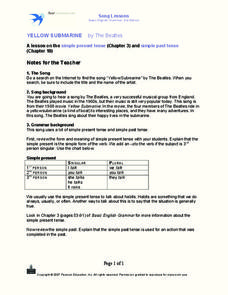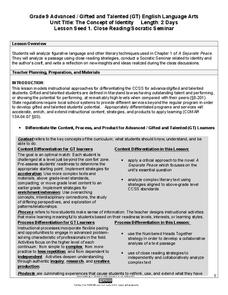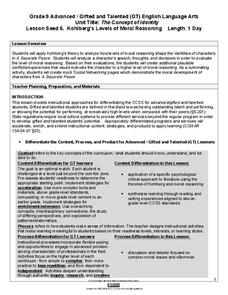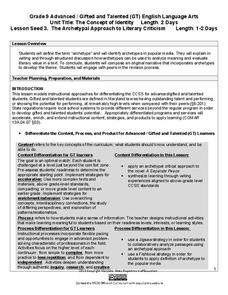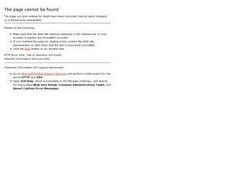Curated OER
The Boy in the Striped Pajamas: Questioning Strategy
Asking questions about the text is a great way for kids to become self-sufficient readers. Use the question-and-response strategy (QAR) to get them thinking about John Boyne's The Boy in the Striped Pajamas. After they read select...
Learn NC
Buffalo Soldiers
"Stolen from Africa, brought to America,/Fighting on arrival, fighting for survival." Bob Marley's "Buffalo Soldiers" provides high schoolers an opportunity to explore the rich history of the Rastafarians in Jamaica and the Buffalo...
Speak Truth to Power
Elie Wiesel: Speaking Truth to Genocide to Power
Invite your learners to discover the efforts of Night author Elie Wiesel to promote awareness of genocide in the world. After watching and reading an interview of Elie Wiesel, high schoolers work to create a living Holocaust museum by...
Pearson
Yellow Submarine
Here's a clever twist on a grammar lesson. Kids listen to the Beatles' happy children's song, "Yellow Submarine" and then identify the simple present and past tense verbs in the lyrics.
My Access
“Banning Books” Lesson Plan
To Kill a Mockingbird, Hunger Games, Brave New World. Welcome to Banned Books Week. As part of a study of censorship and book banning, class members investigate censorship, the purposes of censorship, and First Amendment rights,...
Maryland Department of Education
The Concept of Identity Lesson 1: Close Reading/Socratic Seminar
John Knowles' A Separate Peace provides readers with an opportunity to develop their close reading and analytical skills as they look for what Knowles feels are the factors that shape our identity.
Maryland Department of Education
The Concept of Identity Lesson 2: The Historical/Biographical Approach
"How does our environment shape our identity?" After researching biographical information about John Knowles and considering how these experiences are reflected in A Separate Peace, class members consider the strengths and weaknesses of...
Maryland Department of Education
The Concept of Identity Lesson 5: Motivation - Maslow's Hierarchy of Needs
Maslow's Hierarchy of Needs provides the lens class members use to analyze and evaluate the motivations of the characters in Sylvia Plath's "Initiation" and scenes from Mean Girls. Readers then select a character from A Separate...
Maryland Department of Education
The Concept of Identity Lesson 6: Kohlberg's Levels of Moral Reasoning
How does our moral reasoning shape our identity? After a study of Kohlberg's Levels of Moral Reasoning, readers use Kohlberg's theories to analyze the speech, thoughts, and decisions of a character in A Separate Peace. They then create...
Maryland Department of Education
The Concept of Identity Lesson 7: Logical Fallacies
What are the effects of competition in an academic environment? The competition between the main characters in A Separate Peace motivates a series of activities that asks readers to take a stance on competition, and then to develop a...
Maryland Department of Education
The Concept of Identity Lesson 8: Propaganda in Visual Media
Visual and print propaganda are featured in a lesson that asks readers of A Separate Peace to examine the techniques used in propaganda from World War I, World War II, presidential elections, and in the novel.
Maryland Department of Education
The Concept of Identity Lesson 3: The Archetypal Approach to Literary Criticism
As class members continue their study of approaches to literary criticism, readers examine the symbolism and archetypal patterns in John Knowles' A Separate Peace, and how these parallels are used to develop a theme in the story.
Maryland Department of Education
The Concept of Identity Lesson 4: The Psychological Approach
Readers apply Sigmund Freud's theories of the unconscious mind and the psychological approach to literary criticism to analyze and evaluate the relationship between two characters in A Separate Peace.
Maryland Department of Education
The Concept of Diversity in World Literature Lesson 12: Author's Purpose - Yeats and Achebe
Is there such a thing as fate/luck? Can one fight destiny? As part of their study of Chinua Achebe's purpose in writing Things Fall Apart, class members answer these questions from Achebe's point of view and then from William Butler...
Curated OER
Johannes Gutenberg and the Printing Press
Students use library or online resources to create time lines on the life of Johannes Gutenberg and tell the impact his invention, the printing press, had on the development of newspapers.
Curated OER
Homer Price
An engaging and unique lesson that combines literature and economics is here for you. In it, learners read the short story, "The Doghnuts" found in the book Homer Price. Pupils define "capital resources," and utilize a worksheet...
Curated OER
A PICTURE IS WORTH A THOUSAND WORDS
Students compare and contrast characters from various texts and compile the collected data into several graphic organizers.
Curated OER
I Served in the American Civil War
Students research soldier's lives in the American Civil War. They create a video about a soldier's life
Curated OER
Lessons in Legal Ethics: Crime and the Media
High schoolers examine a variety of ethical issues that arise in criminal cases. They get into groups, and perform a case study of a real situation in which many of these ethical issues came up. All of the worksheets needed to...
Curated OER
Arkansas Civil War Bandits and Outlaws
Young historians study civilian Arkansas during the Civil War. They look at the many challenges they faced to keep their homes in order while the men were at war. Learners hear stories of bands of outlaws who ravaged the state during...
Curated OER
Courts in the Classroom: Ritter v Stanton
Students read the case briefs of Ritter v Stanton. They simulate the trial with classmates taking various parts such as appellant, appellee, bailiff, and justices. After conducting a mock argument, they write their own opinion for the case.
Curated OER
How Long is Too Long?
Learners examine the legal term statute of limitations and how it varies based on the type of criminal or civil activity under discussion. They discern the applicable statute of limitations given an hypothetical or actual situation and...
Curated OER
Oral Arguments Online
Students conduct a mock oral argument based on the briefs provided and further research as assigned by the instructor. They write an opinion for the case outlining why one legal argument prevailed over the other based on their own...
Curated OER
Reading Primary Source Documents: Historical Content
Why do we read primary source documents? What can they give us that other writings cannot? Provide your learners with any of the primary sources attached here (there are seven), and have them complete the graphic organizer (which opens...
Other popular searches
- English Law Courses
- Magna Carta, English Law
- Magna Carta English Law
- English Law Corses
- Maegan Car Ta, English Law
- English Law Contract
- Maegan Car Ta English Law
- Magna Carta\\, English Law
- Magna Carta\, English Law
- Magna Carta\\\, English Law
- Maegan Car Ta\, English Law
- English Common Law Labor





